1. Who was best ever PM?
Paul Strangio asked the equestion Who were Australia’s best prime ministers? We asked the experts.
He and colleagues asked 66 political scientists and historians. Here’s the top 10:
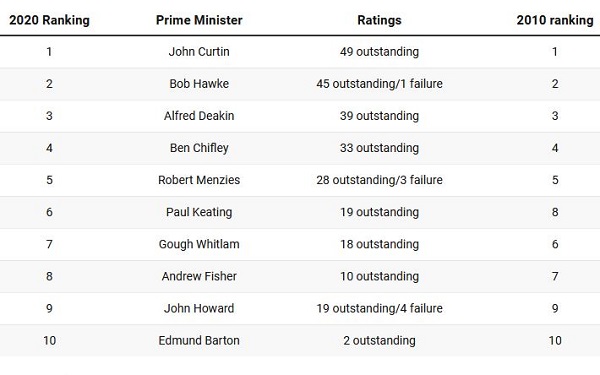
Strangio told Patricia Karvelas that Labor leaders tended to dominate the top spots because of their policy heft.
Curtin was especially favoured because he was leader during WW2, and then set up the institutional structures and policies for a successful recovery.
Julia Gillard squeezes into the top 10 on policy. Here are the top five:

Menzies, Fisher and Howard also rate for policy.
Keating is the big improver from the initial 2010 survey, leapfrogging Howard. I’m betting that Howard’s decline will continue as time goes by, but then in 2017 I did say It’s all John Howard’s fault.
Since Howard, Gillard is the only mid-range PM. The rest are duds, with Abbott challenging McMahon for last spot. Morrison will challenge them both if Bernard Keane is right in Have we ever been led by a worse prime minister than this smirking vacuum?
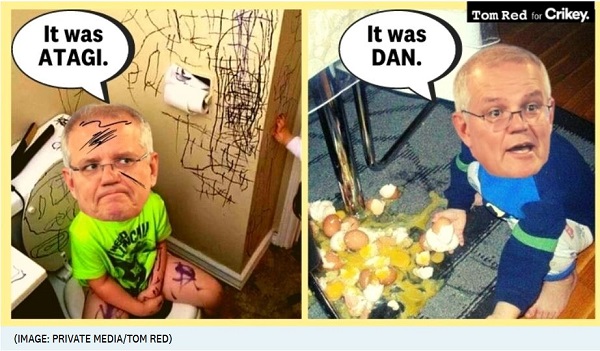
Kevin Rudd, I think, does himself a lot of damage through his anger, his self-promotion and shall he say, his lack of humility. His policy achievements and pre-emptive action in the face of the GFC (including upgrading of the G20 internationally) may be better appreciated with time.
2. Impoverished 20th century politics
John Daley is leaving the Grattan Institute where he was CEO from inception in November 2008, and Energy and Climate Change Program Director from 2020, when he handed over to his daughter Danielle Wood.
On the way out he has taken a look at Australian national politics in a report Gridlock: removing barriers to policy reform. See also his article Tribal gridlock: A hardening of shibboleths is eating away at good government and Laura Tingle’s summary to Phillip Adams.
Daley looked at policy suggestions made by the OECD from 1972 to 2018, and by the Grattan Institute from its existence in 2009.
There is a presumption here that governments should take notice and adopt proposals made by these two organisations, and that policies derived elsewhere don’t count.
Daley’s conclusion is that Australian governments lost there policy mojo about 2003. From the summary:
- Analysis of a large sample of proposed policy reforms over the past decade shows that unpopularity is now an insuperable obstacle to reform. This is a big change from the past when political leaders implemented many unpopular reforms, doing their best to explain why they were in the public interest.
Tribal beliefs that mark membership of political parties and factions have also become major obstacles to sensible reform, particularly in tax, superannuation, and energy policy.
While powerful vested interests blocked some reforms, they had much less influence when countered by the published reports of high-quality inquiries.
Unpopularity, tribal beliefs, and vested interests stand in the way of the public interest because of less effective media, a weakened public service, the power of ministerial advisers, a growing professional political class, and increasing political patronage.
I’ve always thought there was an inflection point in Australian political life in 2001, when John Howard won the ‘Tampa’ and ‘Children overboard’ election. I’ve attributed major blame to Howard and to (Sir) Lynton Crosby, who hit his straps in 2001 in his third campaign as director of the Liberal Party.
Daley says:
- Australia could break the gridlock in policy reform by increasing the expertise and independence of the public service, reducing the number of ministerial advisers closely tied to political parties and making them more accountable, tightening controls over political donations, campaign finance, lobbying, and post-politics careers, and setting up a federal anti-corruption commission with teeth to ensure that the rules of the system are followed.
Unfortunately, politicians from both major parties routinely block such institutional changes because they think they will reduce their prospects of re-election. The most politically realistic path to institutional change is for independent members of parliament to champion institutional changes, particularly when they hold the balance of power.
Problems with our systems of governance are cruelling the chances of policy reform.
The slow corrosion of our institutions is gnawing away at Australian prosperity.
We hope this report galvanises people to change how Australian government works.
When he says “both sides” he adopts the convenient fence-sitting position typically adopted by the ABC, and some others. I absolutely do not think one side is as bad as the other.
3. Labor chooses austerity budgeting?
Labor’s aspirations, however, depend on rounding up enough votes. Frankly, they have just made their road to victory harder.
Back in May commentators were looking at an early election, fought on taxation.
That is, the Coalition wanted to coast through on the shine of doing well on COVID, while attacking Labor as the big-taxing and big-spending alternative.
COVID outbreaks with concomitant lockdowns, together with vaccine rollout failures put paid to all that. Labor has now decided to clear the decks for the next election with what has widely been called tax cuts ‘capitulation’.
Labor will now keep the legislated tax cuts it widely derided and condemned. Under Labor people on $200,000 would get a tax cut of $174pw ($9,000 pa) while a worker on $60,000 pa would get $7pw ($364 pa).
Dennis Atkins puts the knee into the groin in Labor’s electioneering backflips came too late to woo wary voters.
I don’t know who invented the title of the article (it’s usually the editor) but this is not about wooing voters. To me it is avoiding a scare campaign, which Labor will happen anyway.
To me this looks like a choice for austerity budgeting. When asked what Labor intends to do about gaping social justice needs (public housing, JobSeeker, aged care, the NDIS, pensions and more) Atkins points out Labor has put itself in a hard policy corner:
- Will Labor do something? Probably. Will it be enough? Most likely not.
Labor’s policy page now has 21 policies, with more being added all the time. Last election it had over 270 on that site. I felt no-one ever really looked at that page.
David Rowe’s AFR cartoon may have some relevance, with a stretch:
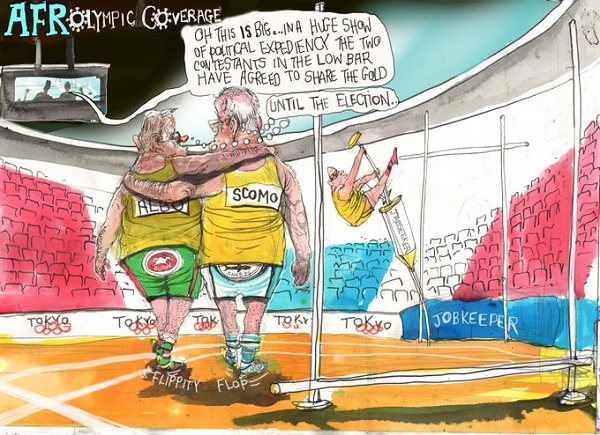
4. Can Scott Morrison reinvent himself?
The shine has come off Morrison’s image in recent times, with carpark rorts. See, for example:
- Paul Karp – ‘Sports rorts on steroids’: scathing report finds Coalition car park program not effective or merit-based
- Yee-Fui Ng – Another day, another rorts scandal – this time with car parks. How can we fix the system?
- Yee-Fui Ng – The ‘car park rorts’ story is scandalous. But it will keep happening unless we close grant loopholes
- David Crowe and Shane Wright – Former judge labels $660 million car park fund ‘corruption’
Simon Falstaff in Car park rorts rot the body politic (AFR) says:
- If we grow weary of saying ‘No’ to pork barrelling, we risk normalising deviancy and making unthinkable political practices acceptable.
He begins:
- I have spent the past two weeks wondering about whether or not there is any point to writing yet another article condemning political corruption among our governments.
Along the way he expresses surprise that Simon Birmingham, who he regarded as sensible, defended corrupt pork-barrelling as part of the normal political process.
And ends:
- I realised this morning that my own reluctance to keep going is, of all the forms of corruption, the most insidious of all. Whether deliberate, or not, our governments are grinding us down – corrupting the democratic spirit of the nation.
The process has a name – the “normalisation of deviance” – by which the unthinkable becomes practically inevitable. It’s just that nobody notices the corruption spread – like gangrene slowly putrefying the body politic, one cell at a time.
There is an antidote. It is deceptively simple. Someone just has to say “NO”. And then another, and then another. But for that to happen, enough of us need to care; enough of us need the resilience and courage to speak out.
I say NO! Will you join me?
When I searched for the Falstaff article, I found Kristina Keneally’s recent speech, because she quoted Falstaff. It’s worth reading if anyone wants to know Labor’s intent.
The Centre for Public Integrity chaired by Anthony Whealy QC, has found that:
- 100% of grant programs audited by the ANAO since 2019 were found to be flawed, with problems identified ranging from minor areas for improvement to serious maladministration.
Of course, Morrison has more problems than carparks. It seems that audit reports and parliamentary committees don’t worry him. It is said that royal commissions probably would, as do opinion polls.
Some of his recent behaviour has no doubt been conditioned by the fact that Newspoll on July 18 showed the Coalition 47/53 down to Labor. In fact the primary vote for both major parties was even, on 39, with Labor +2 and Coalition -2.
Albanese’s personal ratings are not good, but Morrison’s in Newspoll and other polls are sliding noticeably. Most recently see Essential Report.
So Carol Johnson, Emerita Professor of Politics at the University of Adelaide asks Can Scott Morrison reinvent himself? She thinks his dorky dad image, which Labor failed to react to in the last election, is not serving him so well.
Her bottom line is that a lot of people have suffered much from his COVID handling, so:
- If Morrison wants to reinvent himself as Australia’s protector rather than a somewhat surly failure, he has a lot of work to do. And his greatest enemy isn’t the Labor Party, despite its resurgence in the polls, but a virus that he seems to have repeatedly underestimated during 2021. To tweak both US campaign advice and Morrison’s own words, “It’s the virus, stupid!
David Rowe sees Morrison tackling himself:
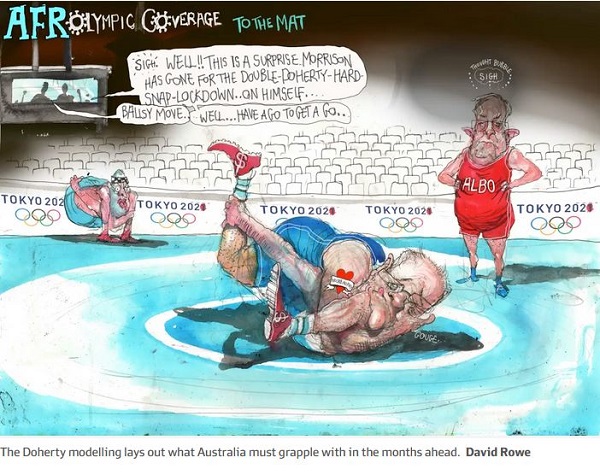
Update:
We don’t seem to be able to get out of the weeds. First ‘Slap in the face’: Grace Tame blasts Porter return.
Christian Porter is made leader of the house while Peter Dutton has to isolate at home through virus exposure.
Then Alan Tudge ‘runs away’ from questions on carpark scandal. Literally.
This is one of many I could have added Is this the NDIS’s robodebt moment?
If Labor wants to differentiate itself it could use:
- corruption
- COVID
- climate.

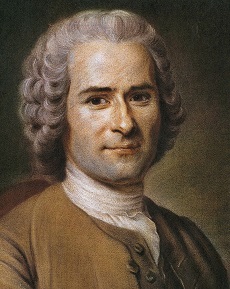
I had other items, including one on feral animals, plus Ash Barty’s secret weapon.
She is such a breath of fresh air in the public realm, with grace and poise whether winning or losing.
She has a secret no-one talks about, although it is really no secret, and we could all learn a bit.
Perhaps, next time, along with why frogs are dying everywhere, why the soil is not a good place to store carbon, why the air, everywhere, is chemically polluted and poisoned, and why the Neanderthals were good at art, and….
The major event of my day so far has been an email purporting to be from McAfee virus protection company, saying my 5-year free subscription was over, and my bank account would be debited $399.99 for a new sub unless I rang them and got it stopped.
They had my email, and were emailing from a Optus account that looked kosher.
It’s scam, of course, but I did once have a McAfee free sub, and an imperfect memory about whether I had ever paid.
It led me to ring both banks I commonly deal with, who said just delete it, and confirmed I had no authority on the account that might lead to a payment.
So just click on nothing, just delete it and put a block on the sender.
Both banks said there was increased activity of this kind since COVID.
New IPCC will be out soon, so my next post will be about that.
David Spratt has greeted the report with Warnings signs as global oil and gas giants adopt “Net zero 2050” climate goal, which links to “Net zero 2050”: a dangerous delusion.
See also at RenewEconomy:
Net zero target for 2050 is too slow, and a strategy for climate failure
I’ve added a couple of David Rowe cartoons, plus and update:
Update:
We don’t seem to be able to get out of the weeds. First ‘Slap in the face’: Grace Tame blasts Porter return.
Christian Porter is made leader of the house while Peter Dutton has to isolate at home through virus exposure.
Then Alan Tudge ‘runs away’ from questions on carpark scandal. Literally.
This is one of many I could have added Is this the NDIS’s robodebt moment?
If Labor wants to differentiate itself it could use:
Report on a country that is far far away: “This week in US politics: The Delta variant has put coronavirus to the front of the Biden agenda.”
Just one example:
Bloody hell. At least my American family lives in a Democrat state.
Brian: You might also be interested to know that: “Donald Trump blames ‘leftist maniacs’ for USA’s bronze medal in women’s football at Tokyo Olympics.”
I finally looked up the definition of “woke” as used by people like Trump:
It is not just the US: “French protesters reject President’s vaccination health pass.
Protesters angry over government measures they say unfairly pressure people to get COVID-19 vaccines have marched in cities across France for a fourth consecutive weekend.
Vaccination rates have spiked since President Emmanuel Macron announced the health pass
They denounced new rules compelling health workers to get the jab and for citizens to have a health pass in order to carry out many daily activities.
More than 230,000 people took part in the protests across France, the highest number over the past month, the interior ministry said.”
“France, which has seen more than 200,000 coronavirus deaths, is reporting at least 20,000 new infections every day in August, as the Delta variant presents new challenges to authorities.”
“The protests have united a disparate group against President Emmanuel Macron’s legislation.”
Today we were set free, but Palaszczuk, just set free herself, reminded us that we are not out of the woods, as it were, and may still be back into lockdown in a day or two.
My feeling is that we may have been liberated a bit early. There was a new case in Mudgeeraba (behind the Gold Coast) and a taxi driver in Cairns, who has been out and about for a couple of weeks, causing Cairns to be locked down.
Teachers are going to be given priority, I think secondary students will wear masks and it will be voluntary for primary kids.
I’m surprised that NRL and other sports events will be able to have 50% crowds next weekend.
Peter Singer – Why Vaccination Should be Compulsory.
I didn’t know that 50 years ago Victoria was the first jurisdiction in the world to make wearing seat belts compulsory.
I’m just trying something out:
Alex Glenn, captain of Broncos, will retire at the end of this year
It works. I use italics + ul rather than blockquote. If I add ul manually it works, where it didn’t before.
What is ul Brian? Can you please expand on that description.
bilb if you put < then ul then > it indents the sentence about 3 spaces from the left margin. You end it by repeating and inserting the usual / after the < and before repeating ul>.
Hope that makes sense.
You mean
like this?<//_>
Well, no bilb, I’ll have to email you. It all gets hidden on the blog.
I’m a real dunce in this department, Brian. I appreciate the help.